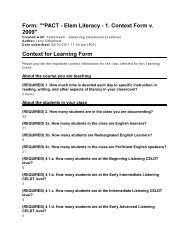The Tutoring Book - California State University, Sacramento
The Tutoring Book - California State University, Sacramento
The Tutoring Book - California State University, Sacramento
Create successful ePaper yourself
Turn your PDF publications into a flip-book with our unique Google optimized e-Paper software.
121<br />
Katie Johnson<br />
Fall 2004<br />
<strong>The</strong> Writing Center Catch-22: Helping Writers Succeed While Questioning Our Own Assumptions<br />
about Academic Discourse and Standard English<br />
Have you heard of the Students’ Right to <strong>The</strong>ir Own Language? If you are anything like me, most<br />
likely you have not, for I only happened upon it by chance while doing research last semester. First, let<br />
me give you some of the background information and important concepts underlying the Students’ Right<br />
before explaining how it will be relevant to your experience as a tutor in the writing center (and believe<br />
me, it is relevant).<br />
In 1972, the Executive Committee of the Conference on College Composition and Communication<br />
declared its support for students to speak the dialect – standard or not – of their choosing in the<br />
classroom; in a special 1974 issue of CCC members detailed the linguistic and social grounds in support<br />
of this proclamation. Thirty years later, I find myself grappling with many of the questions this<br />
movement raised. For example, why is “standard” English the standard? “[W]ould we accomplish more,<br />
both educationally and ethically, if we shifted the emphasis [on uniformity in speech and writing] to<br />
precise, effective, and appropriate communication in diverse ways, whatever the dialect?” (“Students’<br />
Right” 2, emphasis added).<br />
It is important to understand that the writers of SR and other advocates of dialect-diversity “do not<br />
condone ill-organized, imprecise, undefined, inappropriate writing in any dialect” (8). <strong>The</strong>y are not, in<br />
other words, suggesting that academic standards should be relaxed but are instead calling for those<br />
standards to be reassessed, challenged, and ultimately, broadened in order to reflect the growing diversity<br />
of the student body 1 . Writers of SR convincingly argue that standard English holds no linguistic<br />
superiority over non standard dialects. Dialects themselves are neither good nor bad, and prestige, rather,<br />
is “externally imposed” upon them (5). Often times the more power and influence a speaker is thought to<br />
have, the more prestige is afforded to his or her dialect (5). Proponents of SR point out that speaking a<br />
nonstandard dialect impairs neither the ability to read (6-8), write (8), think (9), nor communicate<br />
meaning.<br />
On the other hand, there are many who argue that learning the “dominant” discourse benefits<br />
students. For one thing, it allows them to participate in the academic conversation. Learning the<br />
conventions of academic discourse may, some argue, actually facilitate a change in one’s thought process<br />
and often times one’s world view. I should point out that this process (of adopting the “academic” world<br />
view) can be extremely confusing and difficult, especially for students whose home world views may be<br />
markedly different than or conflict with that of the university. Many students come to the university<br />
strictly to get a degree so that they will have a better chance of getting a job, and, whether it is fair or not,<br />
employers usually expect a person (especially someone who has been educated at a university) to speak<br />
and write in a certain way, i.e., in standard English.<br />
Not helping students achieve at least some level of proficiency in standard English may very well<br />
disadvantage them because other students will have these skills. Students need tools and strategies to<br />
better negotiate the system, a system which, I might add, is not likely to change overnight. Lisa Delpit<br />
argues the importance of explicitly teaching students the rules of what she calls “the culture of power”<br />
(85). While affirming the validity of nonstandard dialects, Delpit also explains to students “that there is a<br />
power game that is also being played, and if they want to be in on that game there are certain games that<br />
they too must play” (95).

















